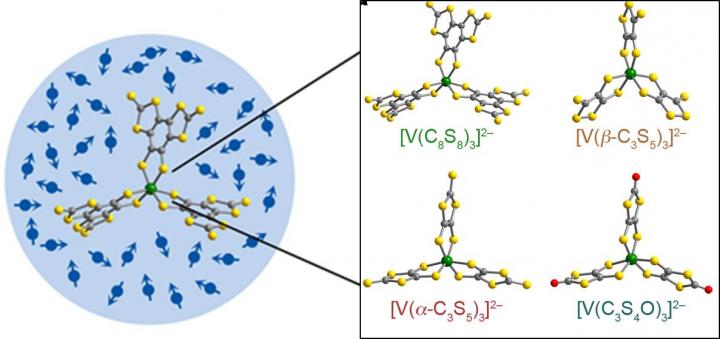A quantum spin on molecular computers

One day powerful quantum computers could be made from molecules like these -- vanadium complexes. Credit: American Chemical Society
Traditional computers rely on transistors that occupy one of two states — that's what those archetypal zeroes and ones refer to, and each digit is a “bit.” Quantum computing would use three states, improving its information storage capacity exponentially.
Whereas a small app like “Angry Birds” takes up about 40,000 standard bits, a computer made with just 1,000 quantum bits, or “qubits,” could easily and quickly break modern encryption schemes or more precisely model how a pharmaceutical drug candidate would perform in a person. The biggest challenge of quantum computing, however, is making the qubit.
Some of the most promising qubits today use electrons, specifically their “spin” state. Spin can have two states, just like a bit, but also a combination of both to form a third state, called “superposition.” But very few molecules stay in the superposition state long enough to measure, which makes them difficult to use in computing.
One reason is that the interaction of spins on most nuclei can interfere with the electronic ones. To get closer to a real, functional qubit, Danna Freedman and colleagues turned to metal complexes, where most of those problematic nuclear spins were eliminated.
Freedman and colleagues synthesized vanadium complexes with arms made of carbon and sulfur. As long as the system was kept cold, these molecules kept superposition longer than any metal complexes previously reported. They also kept that state for just as long as other bulk materials currently under consideration.
These new molecules show that under the right conditions, inorganic complexes can function as viable qubits. In addition, the complexes may prove to be superior to other potential materials because their defined chemical structure could more easily allow the organized design of functional devices. To get a little meta: it's possible that one day computers made of just a handful of small molecules will be used to make predictions about other molecules.
The authors acknowledge funding from Northwestern University, the State of Illinois, the National Science Foundation and the Department of Energy.
The paper will be freely available on Dec. 2 at this link: http://pubs.
The American Chemical Society is a nonprofit organization chartered by the U.S. Congress. With more than 158,000 members, ACS is the world's largest scientific society and a global leader in providing access to chemistry-related research through its multiple databases, peer-reviewed journals and scientific conferences. Its main offices are in Washington, D.C., and Columbus, Ohio.
To automatically receive news releases from the American Chemical Society, contact newsroom@acs.org.
Media Contact
All latest news from the category: Life Sciences and Chemistry
Articles and reports from the Life Sciences and chemistry area deal with applied and basic research into modern biology, chemistry and human medicine.
Valuable information can be found on a range of life sciences fields including bacteriology, biochemistry, bionics, bioinformatics, biophysics, biotechnology, genetics, geobotany, human biology, marine biology, microbiology, molecular biology, cellular biology, zoology, bioinorganic chemistry, microchemistry and environmental chemistry.
Newest articles

Sea slugs inspire highly stretchable biomedical sensor
USC Viterbi School of Engineering researcher Hangbo Zhao presents findings on highly stretchable and customizable microneedles for application in fields including neuroscience, tissue engineering, and wearable bioelectronics. The revolution in…

Twisting and binding matter waves with photons in a cavity
Precisely measuring the energy states of individual atoms has been a historical challenge for physicists due to atomic recoil. When an atom interacts with a photon, the atom “recoils” in…

Nanotubes, nanoparticles, and antibodies detect tiny amounts of fentanyl
New sensor is six orders of magnitude more sensitive than the next best thing. A research team at Pitt led by Alexander Star, a chemistry professor in the Kenneth P. Dietrich…





















